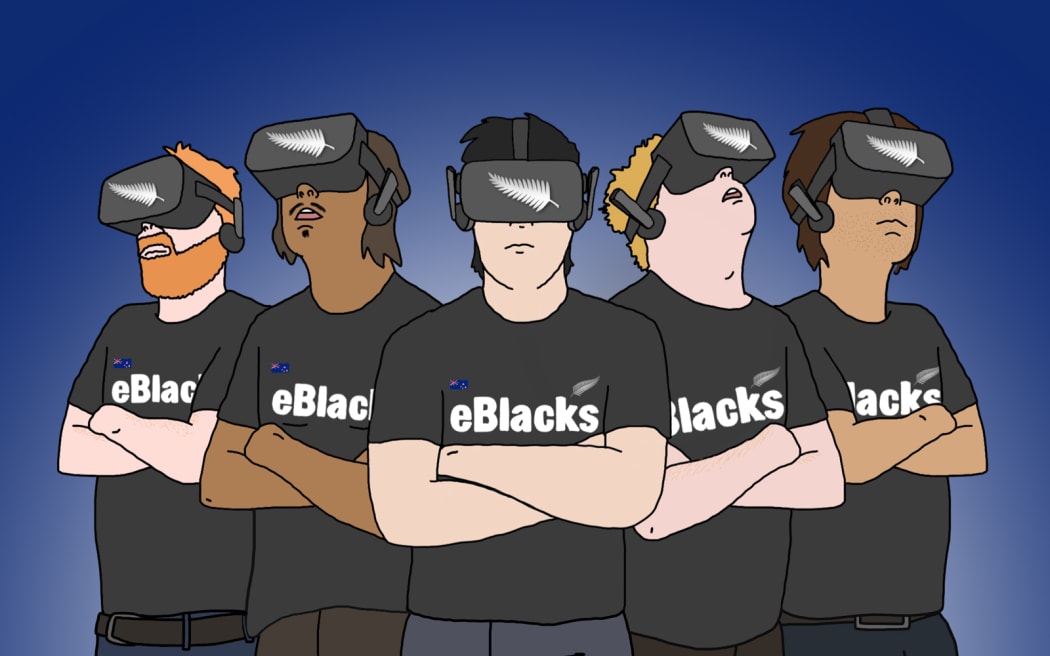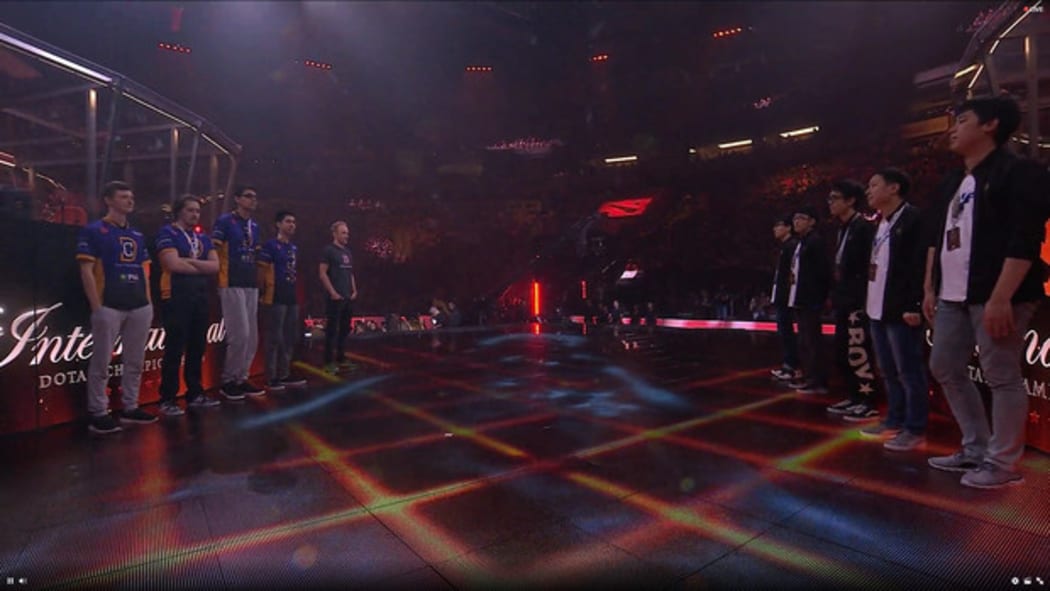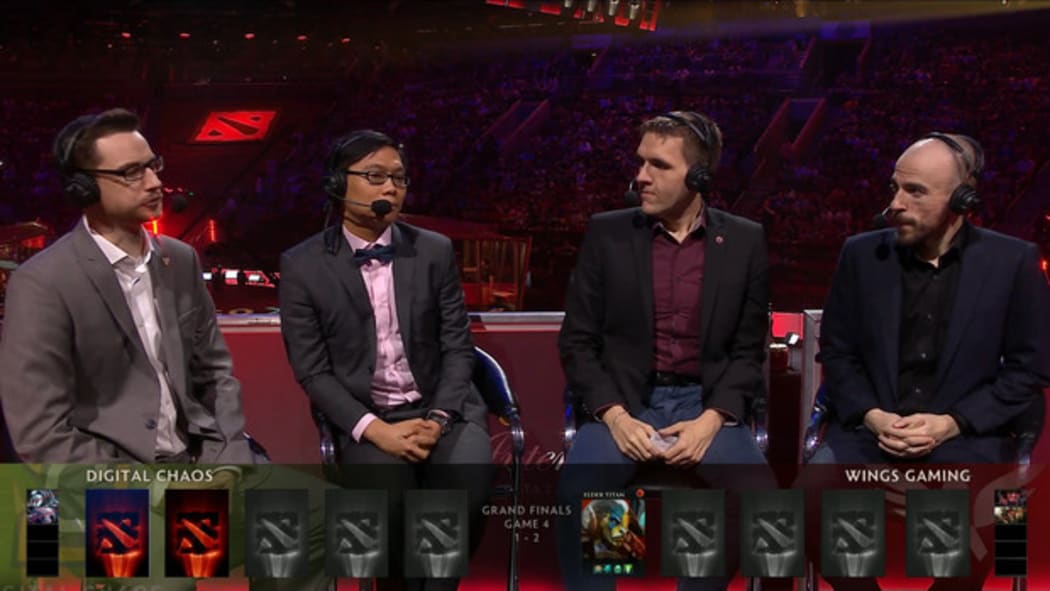With a rapidly growing global audience and tournaments worth millions, it might be time to take eSports seriously.

Photo: Illustration: Lucy Zee
Two teams, ten players, millions of dollars on the line.
Fans dressed in cosplay fill the stadium, watching as ten young men battle in the middle of the arena. The audience cheers for every kill and chants the competitors' names.
The players can see everyone around them, but can’t hear a wisp of the noise. They are kept in sound-proof booths, blocking every noise in the stadium except for the voices of their teammates coming in through their headsets.
They can’t turn around, they can’t take their eyes off the screen, they can’t allow themselves to mess up.
Massive monitors above the players show the match to the audience, with commentators describing the battle at mind-blowing speeds. Around the world millions of fans stream the game live, discussing the events in real time with other viewers.

The players face-off before entering soundproof booths at The International. Photo: Screenshot / Twitch.com
This was the scene last month at the biggest eSport event held so far in the world, The International. Half sports tournament, half fan convention, the event celebrates multiplayer battle game Dota 2. Sixteen teams from 14 countries competed in Seattle’s 15,000-plus seat KeyArena for more than US$20 million in prize money - the largest ever purse in pro gaming.
New Zealand didn’t have a team there. That is set to change in the very near future as the New Zealand eSports Federation sets about assembling a group to compete as the “eBlacks”.
***
Countries such as South Korea have funded programs that train young players, inspiring many to go professional. Almost every game that involves national players is aired on television, to a viewer base of over one million. Serbia, China, and Switzerland also fund national players and teams.
In New Zealand, eSports aren’t recognised as an official sport, meaning that no funding is provided by the government, but the New Zealand eSports Federation (NZeSF) is trying to change this. They want local players to be part of the rapidly expanding competitions and the multi-million dollar industry that supports them.
Globally, eSports last year generated an estimated US$748.8m in revenue, with an audience of over 226m watching online. Sports media giant ESPN has gotten in on the game, broadcasting The International on it’s ESPN3 channel and reporting on the top players in eSports.
NZeSF president Ben Lenihan says his organisation wants to provide “a pathway for players to progress and represent our country”.
“The opportunities are not there, and it’s really hard to get high-quality competition if you stay in New Zealand, which I think is a bit of a shame.”
NZeSF is currently trying to gain funding - and official recognition - from the government. Endorsement as the official voice for eSports in NZ would mean more clout on the International eSports Federation, including voting rights and positions on the committees that shaping the competitions, Lenihan says.
Convincing the powers that be is proving as challenging as the toughest battle in an online arena.
Funding organisation Sport New Zealand says eSports do not fall within its sport and recreation portfolio “as they do not involve an aspect of physical activity”. It is "striving to see more New Zealanders, particularly young Kiwis, participating in sport and active recreation. We invest in organisations whose activities are aligned and contribute to these goals.
The argument over whether eSports are actually “real sports” has been contentious ever since the term was first spoken.
To an outsider all the explosions, bright lights, and teleporting in an eSports game look confusing, the exact same way rugby makes no sense to someone who’s never seen it before.
Wellington-based gamer and eSports fan Te One Jacob-Bradley sees the line that defines “sport” as blurry.
"There's quite a bit of dispute about the description, everyone usually ignores it because their personal one is clearly more important," he says.
"Like clay bird shooting, it requires composure, accuracy and timing. But in that regard, if you would define that as a sport by those factors, you could argue competitive whack-a-moles is a sport, because it requires composure, accuracy and timing.
"To be honest I would prefer to see whack-a-moles as a sport compared to clay bird shooting."
Ben Lenihan compares eSports to darts, which receives a small amount of community sport funding. "There's a physical element to it, without a doubt, reaction times, precision. They're not exactly exerting a huge amount of energy, but the physical element is still there."
"Just because the actual action is digital, doesn't make it any less real."

A group of analysts at The International help viewers understand how the teams' drafts can be expected to affect the game. Photo: Sc
The organisation is not short of ambition. The name “eBlacks” has been trademarked and next month there are plans for NZeSF-backed teams to compete in both a League of Legends and Hearthstone team at the 8th eSports World Tournament hosted by the IeSF in Jakarta, Indonesia. The New Zealand players are still to be selected.
NZeSF is also nurturing eSports culture at a more grassroots level.
They are currently running the New Zealand Gaming Championships (NZGC), a national League of Legends tournament playing throughout September and October 2016 in New Zealand. This is the second year the tournament has been held and the final event will be broadcast on Sky Sport 3, as well as in front of a live audience at the Museum of Transport and Technology in Auckland.
The final event will be set up similarly to larger international eSports events, as the NZeSF want to bring “professional level competition” to New Zealand. They have created what they call the “Hexe-Dome,” a six-sided steel and perspex cage that will hold the competitors as they fight to be New Zealand’s best team.
Lenihan wants to assure aspiring players that League of Legends is only the beginning, with early plans to host tournaments for other games being made.
In New Zealand, eSports tournaments are far smaller than their international counterparts. Thousands of fans watch from home, while the number at an event is often in the dozens.
However, Lenihan says that the passion for the game is just as strong as anywhere in the world. Passion is what drives the industry, and what will drive its expansion in New Zealand.
“If you grew up playing a sport, you want to see the very best players in the world doing it. If you love doing something, whether it’s football, or taekwondo, or whatever, at some stage you want to see the very best people doing those things. Video games are no different.”
Lenihan says that once the first steps have been made “true progression can begin”.

